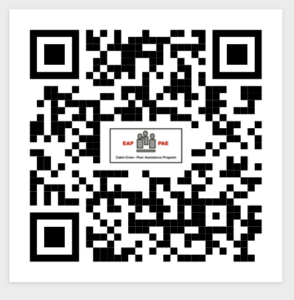Summer Travel and Crew Responsibilities Reminder
As summer is upon us and the increased holiday travel period is here, we felt that it was time to revisit the priorities of your role onboard the aircraft. We are expected to be mindful of service and the needs of our passengers, however our primary function is on board safety and security.
It is important to remember that during the boarding process you are not required to set up the galley at all – in fact, ePub suggests you should be visible in the cabin rather than congregating at the rear of the cabin or standing in the galleys. We have heard from some members that they prefer to show up at the airport early so as not to be rushed. We understand that the workplace can be such a pressure cooker and we respect your right to choose. The fact is that we are all under a great deal of pressure, Mental health is important. We wanted to ensure that you understand that you aren’t required to start any preparatory activities until the posted check-in time.
We are all responsible to stand up for safety. Protect both yourself and your crew by performing the following duties as outlined in your S.E.P. Manual and the Collective Agreement:
1) Your typical duty period starts 1 hour prior to departure on narrow-body flights, however on widebody flights you will be required to report earlier up to a maximum of 1:30 prior to departure. Please refer to ePub, “Availability & Reporting for Duty” to find out the reporting time for specific widebody aircraft types. The employer is within their right to have you start earlier than 1 hour prior to departure (up to a maximum of 1:30 prior), as per Article B5.03, and this time is compensated as per Article 5.08 (pre/post ground duty pay). You are not required to start any duties prior to the start of your duty period – not at the communications centre, not on the bus to the airport, not on the aircraft.
2) At the communications centre you are required to log into Globe, check in, and print your self-briefing material for your pairing. You should check your file folder for communications and transmittals. If there is a safety transmittal, you are required to read and insert this prior to boarding the aircraft if using a paper manual. If using an electronic manual you must ensure your device has the most up-to-date version of the FAM and that it is charged to at least 75%. You are then required to log into ePub and acknowledge receipt of the new transmittals/inserts.
3) You are required to complete all safety checks and procedures prior to boarding passengers. Some of these duties are:
• Attend a safety briefing with your entire crew. Ensure the pilots brief you on flight conditions, taxi time, etc.
• Have up-to-date publications (FAM & OAM) and a valid Cabin Crew Dangerous Goods Training Certificate.
• Ensure Emergency Positions & Equipment checklist is filled out, reviewed, and submitted to the Captain.
• Stow your baggage in designated cabin crew stowage compartments (if there are any service items in your way, call to have them removed).
• Ensure your seat belt is working correctly (sit and fit): securely anchored, fully retractable, not twisted or frayed, inertia wheel operative, seat belt / harness adjusted to fit and stowed.
• All safety and emergency equipment is available and ready to use.
• Ensure that P.A. is functional.
• Water tanks are full and waste tanks have been serviced.
• Safety features cards should be checked to ensure they correspond to the aircraft.
• Safety demo equipment (video and manual) is available and ready to use.
• All circuit breakers should be checked to ensure they are operative.
• Verify that there are no suspicious items onboard, including in the cabin, in the galleys, as well as the galley equipment and lavatories.
• If a Medipak is boarded, make sure it is in its specified location and confirm with the Captain.
• Ensure white tamper evident seals are in place in the lavatories.
• Ensure galley equipment is secured and operative.
• Ensure door areas are clear and available for emergency use.
• Ensure cabin curtains are open and secure.
• The Company also suggests you verify that there is no grease on any of the oven racks and no paper products in the ovens.
Every time you get on board, ask yourself this question… safety or service first?
The contents of this bulletin have been shared a few times with you. The reason for this is that we must be mindful of the value that our work represents and always remain focused on safety. Look after one another, report safety and security issues as required and remember the one crew concept. It is there to ensure that safety will remain our guiding principle. The reality is that by working together, not reporting each other, and communicating in meaningful ways that will bring us all closer to our goal of asserting our value and negotiating for what is rightfully ours.


